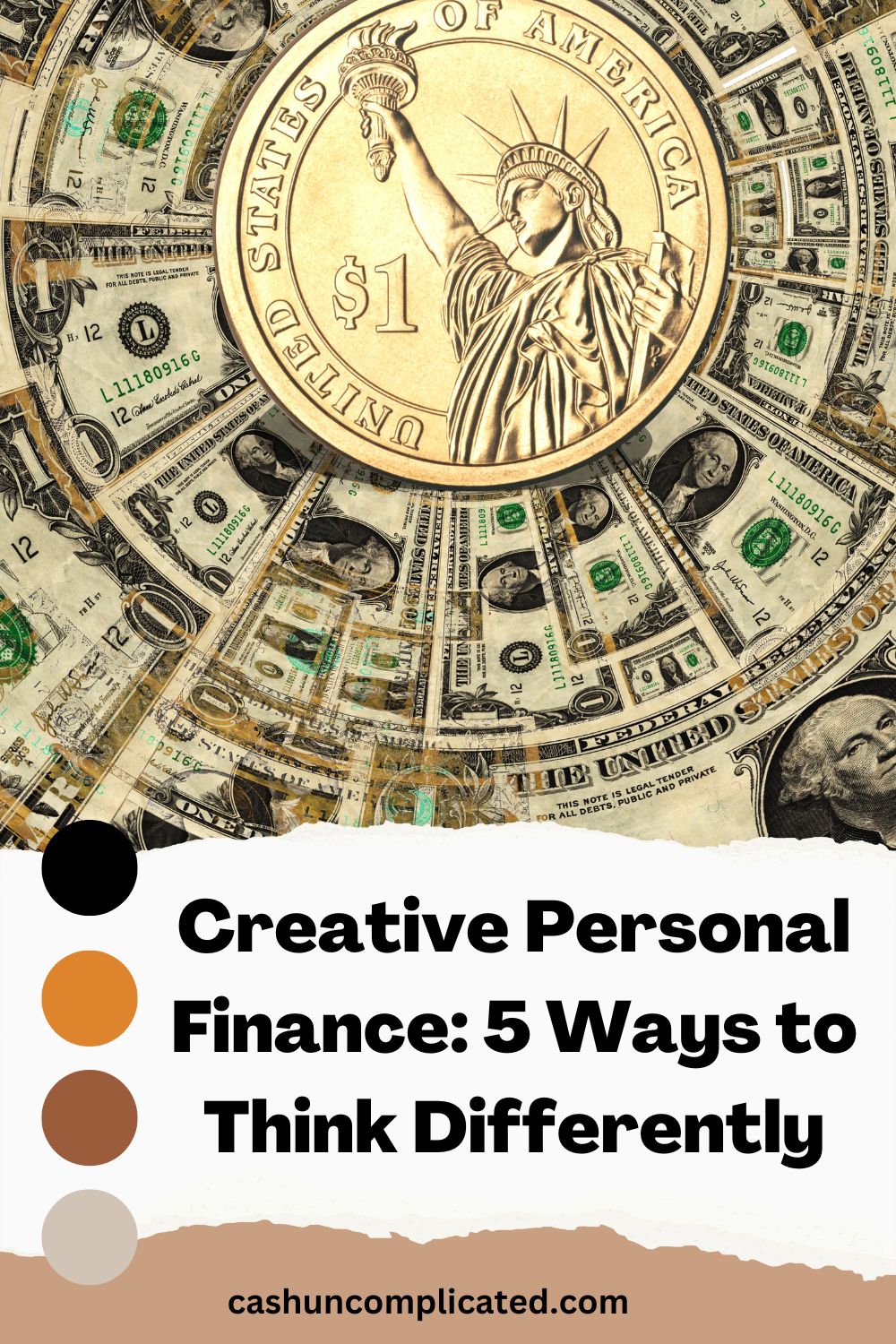I was reading an article about how difficult it is to make it financially in this economic climate. This includes buying a home, saving for retirement, saving monthly, etc. I thought about the post for some time after I read it and the phrase “creative personal finance” kept popping up in my head.
Things Change
No matter what decade you began (or will begin) your “real adult life”, there are different economic challenges from the previous generation.
Young adults in the 2010’s faced different challenges than young adults in the early 2000’s, 2020’s different than the 2010’s, and going back many decades–1980’s different than the 1970’s, etc.
Although there are timeless principles such as pay yourself first, avoid consumer debt, automate your money, etc., there are plenty of things that do change. This is where the concept of creative personal finance comes into play.
One Small Segment of Time Can Set You Up For Years
This is a concept that took me some time to fully understand. Which is the effort put forward in a small segment of time can set you up for years to come.
For example, someone who invests $5,000 per year for five years in their twenties will accumulate more compounding interest than someone who invests $10,000 per year for five years in their fifties.
Even though the person in their fifties invested more, the earlier starter will have substantially more money.
Same thing as someone who reads 50 books on a certain subject matter in their twenties versus someone who reads double that amount in their forties. The person in their twenties has the knowledge earlier and many more years to implement and try new things.
This isn’t to say people should stop growing after they reach a certain age but there are huge benefits for starting early in a focused amount of time.
Five Ways to Think Differently
Success in personal finance, especially in the early years, requires some creativity and outside the box thinking. Here are five ways to think differently about personal finance and money.
Number 1: Supercharge
There are certain things people can do to supercharge their money situation. For most people, there are three or four major expenses that cost them the majority of their money. Those are housing, food, transportation, and healthcare.
If you can find a way to cut into any of these expenses, your monthly bills are likely to go way down. Leaving you with more money to invest and/or save. Here are some examples of supercharging your money:
- Get a roommate or roommates to cut down on your housing costs, maybe even reducing your housing expenses to zero or very little
- Live near work so you can walk, work from home, take public transportation, etc.
- Bring your lunch to work multiple times per week and cook dinner at home most nights
- Find a job with benefits that pay most of your healthcare costs
Doing any of these things has the potential to significantly reduce your monthly bills. For example, someone who buys or rents a house with four bedrooms. Live in the smallest room and rent out the other three.
If the monthly rent or mortgage is $2,500 per month and you rent out each room for around $800, your housing costs are reduced to pretty much nothing. In this scenario, you’d be collecting $2,400/month in rent while your mortgage or rent is $2,500. That leaves you only having to cover $100, which is far less than almost anyone in the United States.
Or for someone who doesn’t want long-term roommates, listing your house on Airbnb for a weekend or two every month can cover (or come close to) the cost of your housing. Other options are short-term renting rooms by the night, renting out the entire house a few weeks during the summer when you’re traveling, etc.
Number 2: Recognize Temporary Versus Permanent
There’s a common misconception that the decision you make today is permanent, or semi-permanent. I believe there are stages of life and strategies for each stage. I’ll give an example using the home buying process.
Buying your first home isn’t a permanent thing, but a lot of people behave as it will be. You don’t have to go from living in an apartment in your twenties to your dream house. There may be some in between stops like buying a two- bedroom condo or three-bedroom house that you rent out to friends.
People want to go from A to Z, forgetting about all the other letters in the alphabet. Life is hard when you skip steps and can’t wait to get to the end.
When I bought my first property, I left a house I was renting with friends for a one-bedroom condo. The condo was nice enough, but it was pretty far away from my dream home. I couldn’t afford the dream home at the time but I could afford the condo, so I bought it.
The condo was a temporary living situation for about four years. Then I bought a small three-bedroom house that I’ve since converted to a much larger house with an ADU. Still not my dream house, but it’s taking me a step closer to my goals.
I also kept the one-bedroom starter condo as a rental and it’s provided solid rents and appreciation. At some point, I’ll have the option to sell it, keep renting it as is, or pull equity.
Point being, purchasing the one-bedroom condo wasn’t an end game for me, but a temporary stepping stone. By thinking temporary while keeping the end in mind, my financial life is better today than it would have been if I waited for the “dream house.”
Number 3: Think Short and Long-Term
This is a good segway to my third tip, which is to think short and long-term. It’s great to have long-term goals and strive for excellence. There’s also a place to think short-term as long as those actions will move you towards your bigger goals.
This is especially applicable in the personal finance space. Someone fresh out of college who wants to reach financial independence through real estate isn’t going to reach that overnight. But they can start taking actions towards that goal in the short-term.
Short-term goals this person can set:
- Rent out rooms or Airbnb the house on select weekends
- Buy an inexpensive car for a couple years and invest the surplus
- Walk to work instead of taking a rideshare and invest the savings
- Work a side hustle two weekends a month and invest all those earnings
None of these action items require that you do them long-term. You can have roommates for a couple years and then have them move out. Upgrade the car after a few years. Cut back your hours on the side hustle or quit it altogether after a year or two.
These temporary action items are just meant to get you started down the right path, not to be a permanent solution. But they will start the compounding and put you leaps ahead of where you would otherwise be.
Number 4: Be Flexible
Number four on the list of how to be creative in personal finance is to be flexible. Different seasons of your life require different flexibility. Adapt and role with the punches. Find new opportunities and take advantage of them.
When I was in my twenties I rented a house with four bedrooms. I had the largest room at the end of the house. One summer while I was on a trip, the room was declared an illegal addition and had to be torn down. So when I came home, my room was torn down.
To get a comparable room in the area of town I was living would have cost at least $700 more per month to rent. Which was a lot of money to me at the time. Rather than try to chase a comparable sized room, I decided to move into the one vacant room in the house, a fraction of the size of my old room.
I’d get to stay in the house that way (and pay less rent), but would have to decrease my standard of living. It stung for a while but being flexible saved me a good amount of money every month.
I’d like to say I invested the difference, but the reality is I used most of the money for my monthly living costs, saving just a little bit.
Whatever I chose to do with the money, the fact remained that being flexible made my financial life a lot more comfortable by not having to press just to pay rent. I was also rewarded when a few years later, housing prices in San Diego dropped significantly in price and I had an opportunity to buy.
With the small amount of savings I had accumulated from renting a smaller room, I was able to put a small down payment on a one-bedroom condo and borrow the rest to get into my first place.
Number 5: Find Solutions That Work for You
The beauty of creative personal finance is there is opportunity everywhere. You don’t have to implement a hundred strategies to be successful with it. Even doing just one or two things can make a world of difference.
Housing is probably the first thing that comes to mind, but there are so many other opportunities to be creative with money. Something simple like carpooling to work can reduce fuel costs, leaving extra money to invest. Even though it’s a small amount of money, it starts the compounding engine and gives you momentum to create further opportunities.
Here are some examples of simple things anyone can do to be creative in their personal finances:
- Travel hack
- Find a cheaper way to get to work like carpool, walk, take public transportation, etc.
- Buy fruits and vegetables seasonally and at a lower cost
- Drive an inexpensive, fuel efficient car
The opportunities are endless, find what works for you and keep doing it.
Conclusion
For the majority of people (especially those starting out), money is tight. Just getting a job often isn’t enough to succeed in personal finance.
It also takes creativity, flexibility, and ingenuity. An important point to double down on is that life situations are temporary.
- Just because you have roommates in your twenties, doesn’t mean you always have to
- The first house you buy doesn’t need to be your forever home
- Driving an inexpensive car your first few years out of college will allow you to save and invest more, but it’s not a permanent thing
- Stay at a two or three-star hotel instead of a five-star resort for the majority of your travel
Time goes by quickly and before you know it, you’ll really start to see some of the temporary actions you took begin to benefit you. Then you can move towards more comfort and luxury if you want.
What are some creative things you’ve done with your personal finances?










